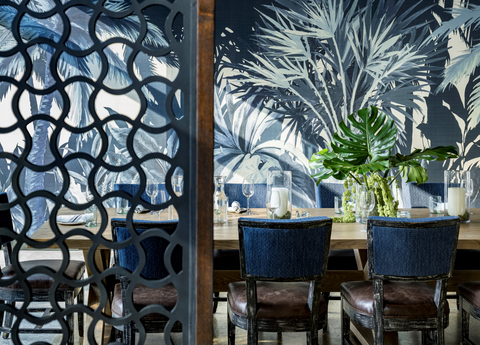By Jonathan Weislow, Amicon
As we near almost a year since the onset of the COVID-19 pandemic, we have seen an unprecedented shift and evolution across every industry. One that has undoubtedly been affected by the pandemic is the hospitality industry. Though there has been struggle and hardship, the team at Amicon and our clients are seeing the light at the end of the tunnel, and in Miami – as one example –hospitality groups are looking to 2021 as a year of improvement and design overhaul.
Moving into a new year, there will be significant changes made to the hospitality industry and a shift in the typical, social dining experience. Here is a selection of designs trends to anticipate in 2021, from our perspective in South Florida:
Open Air Concept
Restaurants, particularly in South Florida, are capitalizing on the region’s beautiful weather to expand their outdoor footprint. Though this comes as no surprise, we are going to see more and more businesses incorporating the use of nanowalls, or retractable walls, to help open up the space to the outdoors. With this expansion, restaurants are able to comfortably accommodate more guests without sacrificing safety. We saw this beautifully executed at our client, Joia Beach, a recently opened restaurant and beach club, and the utilization of their beachfront location to provide guests with complete open-air dining and relaxation.
From Sidewalks to Dining Space

Private dining at The River Oyster Bar in Miami (Photo by: Michael Stavaridis)
A Focus on Nature
In 2021, we are anticipating restaurants to emphasize their landscape architecture, and use vegetation and nature to help make their spaces feel more festive and lively, especially given the social distancing mandate. Restaurateurs want their patrons to feel welcomed and to enjoy their surroundings. Adding touches of greenery, plants and flowers improves the overall feel and aesthetic of a space.
Flexibility and Adaptability
While reimagining their floor plans and size of their spaces, restaurants have had to take a closer look at their dining layouts. 2021 will bring about a new emphasis on multi-purpose furniture and flexible seating, so that the rooms can be shifted to cater to any gathering from regular, socially distanced dining to a intimate, private event. In order to do so, at Amicon we are working with certain clients to build partitions to create separate spaces and more curtains to create intimacy, rather than built-in walls and permanent structure. In the heart of Miami, our client River Oyster Bar has successfully adapted to flexible seating and has found ways to utilize outdoor seating, creating different spaces for the raw bar and then main bar, as well as private dining and communal dining, for example.
Diversification of Their Brand
The main priority for restaurants is to make guests feel safe and excited to get back to a more normal way of socializing and dining, and one way restaurants are doing so is by expanding and diversifying their brand to entice the customer. As one example, our client CHICA, a restaurant with a focus on Latin American cuisine, recognized the need to create a more casual dining concept and developed CHICA Cantina. By developing an underutilized outdoor space of the restaurant, the Cantina will offer a fun atmosphere with different menu options that will operate late night. Restaurants want their guests to come and stay for as long as they can, therefore, we will be seeing more creative, competitive concepts. Brands are looking to find their “alter ego,” or complimentary brand, to get guests in the door for dinner, and stay all night for drinks.
Core Values & Culture
Now more than ever, people are longing for connection and a return to the pastimes that bring them joy, like dining with friends and family. In order to foster this spirit, restaurants are placing an importance on quality customer service. It is the core values and the company culture that will help drive clientele and increase brand loyalty. After months of hardship, we are going to see revamped restaurant culture and what it truly means to be hospitable, so that the first-time diner turns into a loyal follower.
Jonathan Weislow has been a valued member of Amicon for nearly a decade. As vice president of business development and project executive, Weislow has a broad range of responsibilities for corporate and project operations including growth opportunities, client relationship management and project plan strategy. Relating to his work in the hospitality industry for Amicon, the mission to serve as an owner’s advisor has grown stronger as the company has guided their hospitality clients through the hurdles and redirection needed to achieve their goals. It is Amicon’s duty to provide adaptable solutions that include: accomplishing new design concepts within various constraints of an existing timeline, assisting in complex permitting, consulting different stakeholders and team members, as well as ideate on a number of creative concepts to help the client make informed decisions. To learn more about Amicon, visit AmiconManagement.us.
